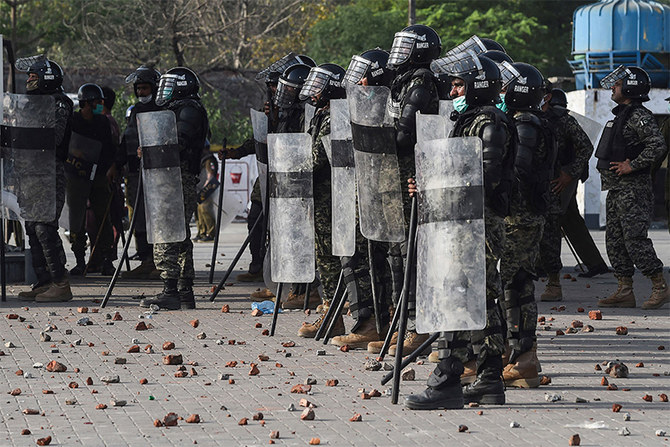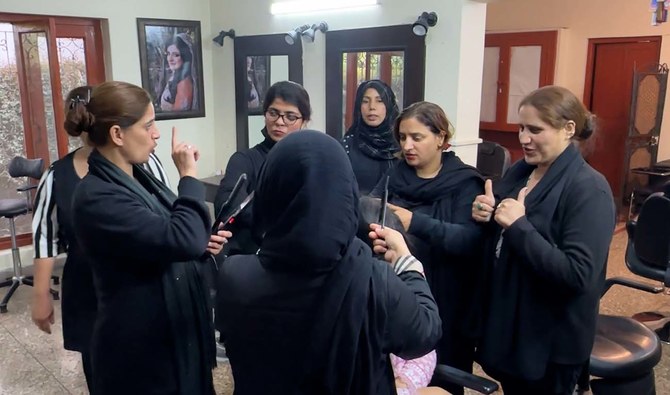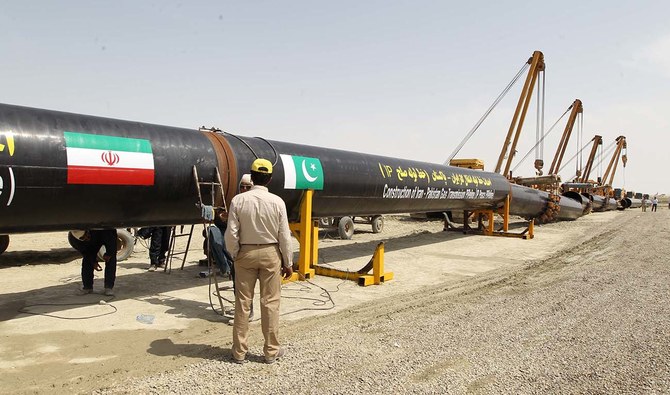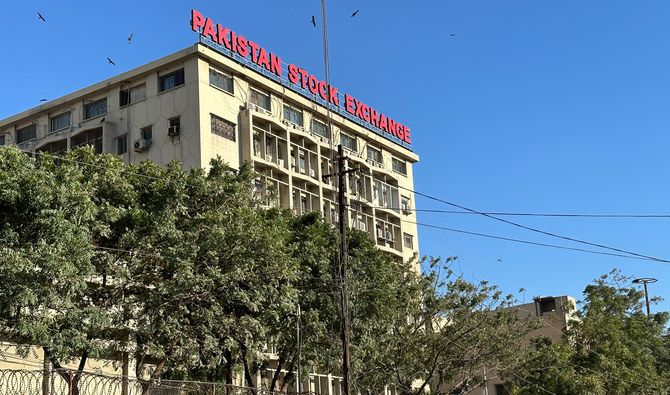ISLAMABAD/KARACHI: Pakistan’s interior minister on Wednesday said the government would ensure “the writ of the state at any cost” after nationwide protests by a religious party entered the third day and one policeman was beaten to death and dozens of policemen and protesters were injured in towns across the nation.
Demonstrations erupted in major Pakistani cities and quickly turned violent after Saad Rizvi, the head of the Tehreek-e-Labaik Pakistan (TLP) religious party, was arrested on Monday.
The government has already given a go-ahead for paramilitary troops to be deployed in major urban centers to quell protests.
“The writ of the state must be ensured at any cost,” Federal Minister for Interior Sheikh Rashid Ahmed was quoted as telling law enforcement agencies while chairing a meeting to review the violence.
Federal Minister for Religious Affairs Pir Noorul Haq Qadri, the secretary interior and other top government officials, including the police chiefs of Punjab and Islamabad, were present at the meeting.
“Strict action will be taken against those taking law into their own hands,” the interior minister warned.
The participants of the meeting also paid tribute to the policemen who had laid down their lives in the line of duty.
On Sunday, Rizvi had threatened the government with protests if it did not expel France’s envoy to Islamabad over blasphemous caricatures of Prophet Muhammad (peace be upon him). Rizvi has called on the government to honor what he said was a commitment made to his party in February to expel the French envoy before April 20 over the publication in France of depictions of the Prophet (pbuh), which has enraged Muslims around the world.
The government of Prime Minister Imran Khan says it had only committed to debating the matter in parliament.
“Troops of Pakistan Rangers (Punjab) are required with immediate effect till the request of de-requisition,” the government of Punjab said in a notification.
Rangers would be deployed in the cities of Rahim Yar Khan, Sheikhupura, Chakwal and Gujranwala, the circular said.
In a press conference on Tuesday evening, science and technology minister Chaudhry Fawad Hussain said “no group or party must even think of dictating the government or the state … If a state allows this, then it will disintegrate and there will be chaos.”
He added: “Every group has a right of protest and we are ready to hold talks [with TLP] if they present their demands in a democratic way.”
In a statement released on Tuesday afternoon, TLP told the government: “You will have to expel the French ambassador under all costs … The country will remain jammed until the French ambassador is expelled.”
In a separate statement, TLP said its protests would go on until Rizvi was released.
ARMED PROTESTERS
Lahore police spokesperson Rana Arif told the daily Dawn newspaper protesters had beaten a police constable to death in Lahore’s Shahdara area on Tuesday, as a result of which a police case had been registered against TLP leaders and supporters. Police have also registered a case against Rizvi on terrorism and other charges, Arif said.
“Over 300 policemen in Punjab, including 97 in Lahore, had sustained injuries, many of them seriously, after violent protesters attacked them with clubs, bricks and firearms,” Dawn reported. “The Gujrat district police officer and Kharian Deputy superintendent of police were among the injured.”
“Hundreds of protesters and policemen were injured and thousands of TLP activists and supporters were arrested and booked for attacking law enforcement personnel and blocking main roads and highways,” Dawn added, saying four people, including a policeman, had been killed.
Police said four policemen had been shot by armed TLP protesters, and the use of firearms by demonstrators had taken law enforcement agencies by surprise.
“In Lahore alone, four policemen were shot at and injured by the armed men of the TLP in the Shahpur Kanjran area. Similarly, two police constables were shot at and injured in Faisalabad,” Dawn reported, adding:
“Two video clips from Lahore in this regard showed policemen, Imran and Aslam, being rushed to a hospital with bullet wounds. In another video clip, an on-duty policeman was seen calling for help to dispatch more force, saying they had come under armed attack by the protesters in Shahpur Kanjran.”
“The TLP armed men opened straight fire on the police and our four constables were injured,” Lahore DIG (operations) Sajid Kiani told reporters on Tuesday evening.
Under a standing order, he said, police had been deployed unarmed and allowed only to use anti-riot gear against protesters. “But it shocked us that the TLP men used guns against the anti-riot force,” Kiani said.
Giving one example, Kiani said when police reached Shahpur Kanjran to clear the national highway, announcements were made in nearby mosques urging TLP followers to take on police.
“Within 10 minutes, some 200 people joined those already present and attacked police,” he said, adding that Lahore police had lodged 19 cases against protesters and cleared the areas of Shahdara, Imamia Colony, Thokar Niaz Baig, Babu Sabu and some parts of Ring Road by Tuesday evening.
Police also conducted an operation in the Chungi Amar Sidhu area to rescue Model Town SP (operations) Dost Mohammad Khosa and five other policemen from protesters holding them hostage at a power grid station.
The Shahdra and Thokhar areas of Lahore also turned into battlefields after hundreds of TLP supporters took several policemen hostage.
In Shahdara, a constable died due to severe head and chest injuries after protesters tortured him with clubs, police said.
Police said TLP activists had occupied and blocked 22 main roads, intersections and areas of Lahore, while reports of violence had also come from Faisalabad, Sheikhupura, Rahim Yar Khan, Sahiwal and Gujrat.
Reports from other parts of Punjab suggested TLP supporters had occupied over 100 points, roads and major intersections of various cities of the province.
Over 1,400 activists of the TLP have been arrested across Punjab, Punjab police spokesperson told Dawn, saying Punjab police had launched major operations, cleared nearly 60 roads and areas, and registered multiple police cases against supporters, representatives and leaders of the TLP.
Speaking to Arab News, Muhammad Ali, a spokesperson of the TLP in Karachi, said at least six workers of the party had died and a large number were wounded due to firing by law enforcement agencies. Hospital and rescue sources only confirmed two deaths.
In a statement released on Tuesday, TLP said seven of its supporters had been killed in police firing, but the figures could not be independently verified.
HISTORY OF PROTESTS
Saad Rizvi became the leader of the Tehreek-e-Labiak Pakistan party in November after the sudden death of his father, Khadim Hussein Rizvi.
Tehreek-e-Labiak and other religious parties denounced French President Emmanuel Macron since October last year, saying he tried to defend caricatures of the Prophet Muhammad (pbuh) as freedom of expression.
Macron’s comments came after a young Muslim beheaded a French school teacher who had shown caricatures of the Prophet Muhammad (pbuh) in class. The images had been republished by the satirical magazine Charlie Hebdo to mark the opening of the trial over the deadly 2015 attack against the publication for the original caricatures. That enraged many Muslims in Pakistan and elsewhere who believe those depictions are blasphemous.
Rizvi’s party gained prominence in Pakistan’s 2018 federal elections, campaigning to defend the country’s blasphemy law, which calls for the death penalty for anyone who insults Islam. It also has a history of staging protests and sit-ins to pressure the government to accept its demands.
In November 2017, Rizvi’s followers staged a 21-day protest and sit-in after a reference to the sanctity of the Prophet Muhammad (pbuh) was removed from the text of a government form.
















